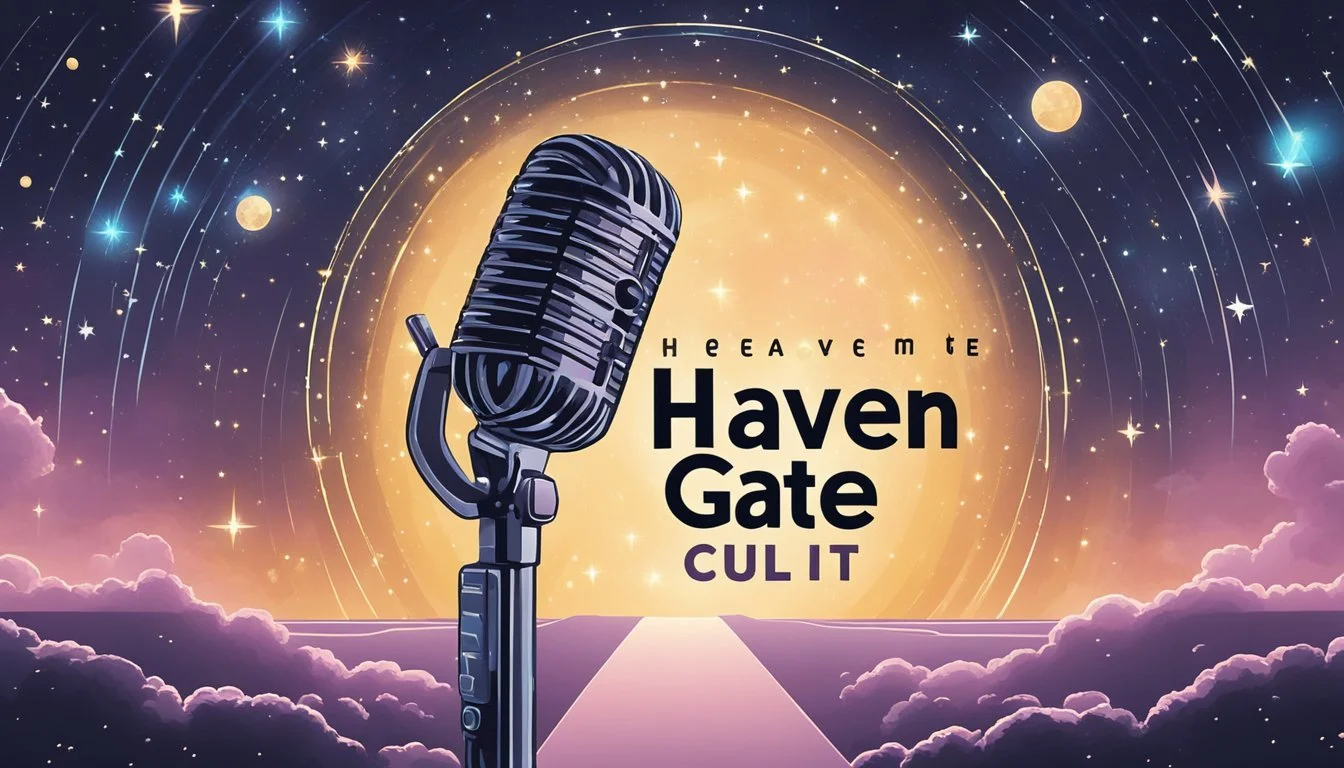Heaven's Gate: Cult Podcast Ascends to Streaming Stardom
Controversial Show Gains Unexpected Popularity
The Heaven's Gate podcast has captivated audiences with its deep dive into one of the most infamous cults in American history. Created by Glynn Washington, the series explores the group's decades-long journey, culminating in the tragic mass suicide of 39 members in 1997. The podcast's success has led to a new four-part docuseries, "Heaven's Gate: The Cult of Cults," now streaming on HBO Max.
Listeners are drawn into the mysterious world of Heaven's Gate through interviews with family members, former followers, and experts. The podcast offers a unique perspective, as Washington himself grew up in a cult environment. This personal connection adds depth to the exploration of cult mentality and its lasting impact on individuals and society.
The transition from audio to visual format allows for a broader audience to engage with this compelling story. The docuseries expands on the podcast's material, providing viewers with additional insights and visual elements that enhance the narrative. As streaming platforms continue to seek out compelling content, the Heaven's Gate podcast's adaptation demonstrates the growing appetite for in-depth, thought-provoking explorations of controversial topics.
The Origin of Heaven's Gate
Heaven's Gate emerged in the 1970s as a new religious movement that blended elements of Christianity, ufology, and science fiction. The group's formation and early development set the stage for its eventual tragic end.
Cult Ideology and Beliefs
Heaven's Gate taught that Earth was about to be "recycled" and the only way to survive was to leave one's human body and ascend to a higher level of existence. Members believed in extraterrestrial life and saw themselves as evolved beings inhabiting human bodies. The group practiced strict asceticism, including celibacy and detachment from worldly possessions.
Heaven's Gate followers maintained that a spaceship hiding behind the Hale-Bopp comet would transport them to the "Next Level" - a physical and spiritual realm above human existence. This core belief shaped their lifestyle and ultimate fate.
Key Figures and Leadership
Marshall Applewhite and Bonnie Nettles founded Heaven's Gate in 1974. Known to followers as "Do" and "Ti" respectively, they claimed to be the two witnesses described in the Book of Revelation.
Applewhite, a former music professor, served as the group's charismatic leader. He crafted much of the cult's doctrine and led recruitment efforts. Nettles provided spiritual guidance until her death in 1985.
The leadership structure was hierarchical, with Applewhite at the top. He exerted significant control over members' lives, dictating everything from diet to personal relationships.
Rise to Infamy
Heaven's Gate catapulted from obscurity to global notoriety through a tragic mass suicide event that shocked the world. The cult's beliefs and actions captivated public attention, sparking intense media coverage and widespread debate.
Historical Context and Mass Suicide Event
In March 1997, 39 members of Heaven's Gate took their own lives in a coordinated mass suicide. The group, led by Marshall Applewhite, believed they were leaving their earthly bodies to board a spacecraft hidden behind the Hale-Bopp comet.
The followers were found in a mansion near San Diego, California. They wore identical black uniforms and Nike sneakers. Each member had a five-dollar bill and three quarters in their pockets.
The group had meticulously planned their exit, recording farewell videos and updating their website with a final message.
Media Coverage and Public Reaction
News of the Heaven's Gate mass suicide spread rapidly, dominating headlines worldwide. Media outlets scrambled to understand and explain the cult's beliefs and motivations.
The public reaction was a mix of horror, fascination, and confusion. Many struggled to comprehend how 39 individuals could be convinced to take such drastic action.
Experts in religion, psychology, and cult behavior were frequently interviewed. They offered insights into the group's UFO-based theology and the powerful influence of charismatic leaders.
The event sparked debates about religious freedom, mental health, and the nature of belief. It also raised concerns about the potential dangers of fringe religious groups and their impact on vulnerable individuals.
From Tragedy to Podcast
The Heaven's Gate mass suicide shocked the world in 1997. Two decades later, this tragic event became the subject of a popular podcast series that captivated audiences and eventually inspired a docuseries.
The Creation of the Podcast Series
The Heaven's Gate podcast launched in October 2017, marking the 20th anniversary of the cult's mass suicide. Produced by Pineapple Street Media and Stitcher, the series aimed to explore the group's history and beliefs. It featured interviews with former members, families of the deceased, and experts on cults.
The podcast quickly gained traction, offering listeners a deep dive into the enigmatic world of Heaven's Gate. Its success led to the development of a four-part docuseries titled "Heaven's Gate: The Cult of Cults," which premiered on HBO Max in December 2020.
Glynn Washington and 'Snap Judgment'
Glynn Washington, known for hosting the popular radio show and podcast "Snap Judgment," was chosen to narrate the Heaven's Gate series. His involvement brought a unique perspective to the project.
Washington's personal experience with a religious group in his youth added depth to his narration. His storytelling skills, honed through years of hosting "Snap Judgment," helped make the complex and sensitive subject matter accessible to a wide audience.
The podcast's ten episodes provided a comprehensive look at Heaven's Gate, blending historical facts with personal accounts. Washington's engaging narration style contributed significantly to the series' success and its eventual adaptation into a streaming docuseries.
Impact and Reception
The Heaven's Gate podcast captivated audiences with its in-depth exploration of the infamous cult. It sparked widespread discussions about religious extremism and the power of charismatic leadership.
Cultural Impact and Listener Reviews
The podcast resonated deeply with listeners, garnering millions of downloads. Many praised its balanced approach to a sensitive topic. Reviewers highlighted the show's ability to humanize cult members without glorifying their actions.
Gail Maeder's story, a former Heaven's Gate member, particularly moved audiences. Her experiences provided unique insights into the cult's inner workings.
The series inspired a renewed interest in cults and their psychological effects. Online forums buzzed with discussions about the podcast's revelations.
Expert Contributions and Analysis
Renowned psychologists and religious scholars lent their expertise to the podcast. Their analysis shed light on the cult's manipulation tactics and belief systems.
Experts explored the factors that made Heaven's Gate appealing to its members. They examined the role of technology and apocalyptic beliefs in the cult's formation.
The podcast's thorough research impressed academic circles. It became a reference point for studies on new religious movements and cult psychology.
Mental health professionals praised the show for its sensitive portrayal of cult survivors. They noted its potential as an educational tool for recognizing and preventing cult recruitment.
Behind the Scenes of Production
The "Heaven's Gate" podcast took months of meticulous research and preparation. Producers combed through extensive archival materials, including recordings and writings left behind by the cult.
Glynn Washington, the host, brought a unique perspective to the production. His personal experience with a religious group informed his approach to interviewing former members and their families.
The podcast team faced challenges in crafting a balanced narrative. They worked to present the story objectively while respecting the sensitivities of those affected by the cult's tragic end.
Production involved traveling across the country to conduct in-person interviews. This allowed for more intimate conversations and helped build trust with subjects.
Audio editing played a crucial role in creating the podcast's immersive atmosphere. Sound designers carefully selected music and ambient sounds to enhance the storytelling.
The episodic format allowed for deep dives into different aspects of the Heaven's Gate cult. Each installment focused on specific themes or time periods in the group's history.
Fact-checking was rigorous throughout the production process. The team consulted with experts to ensure accuracy in their reporting of complex theological and sociological concepts.
Engaging the Audience
The Heaven's Gate podcast captivated listeners through strategic marketing and audience growth initiatives. Its compelling content and distribution methods helped attract seekers interested in the cult's story.
Marketing Through RSS Feed and Social Media
Stitcher Studios leveraged RSS feeds to distribute the Heaven's Gate podcast across major platforms. This ensured easy access for listeners on their preferred apps. The studio also maintained active social media accounts to promote new episodes and engage with fans.
Teasers and clips were shared on Twitter, Instagram, and Facebook to pique interest. Behind-the-scenes content gave followers exclusive glimpses into the production process. Hashtags like #HeavensGatePod helped increase discoverability.
Audience Growth Strategy
The podcast implemented several tactics to expand its listener base. Episodes were released on a consistent schedule to build anticipation and habit. Guest appearances by host Glynn Washington on other popular podcasts helped cross-promote the show.
Stitcher encouraged listeners to rate, review, and share the podcast. This word-of-mouth marketing amplified reach. The studio also analyzed listener data to optimize episode length, content, and release timing.
Collaborations with true crime and cult-focused podcasts tapped into existing interested audiences. The later HBO Max docuseries further boosted the podcast's profile and listenership.
Insights from Family and Former Members
The Heaven's Gate podcast offers unique perspectives from those closest to the cult. Family members of followers share their experiences of losing loved ones to the group's teachings.
Former members provide firsthand accounts of life within Heaven's Gate. They describe the group's daily routines, beliefs, and the charismatic leadership of Marshall Applewhite and Bonnie Nettles.
Some interviewees recount growing up in the cult environment. Their stories shed light on how children were raised within Heaven's Gate's isolated community.
The podcast also features individuals who left the group before its tragic end. These ex-members explain their reasons for joining and ultimately departing from Heaven's Gate.
Personal anecdotes reveal the emotional toll on families torn apart by cult involvement. Siblings and parents express their struggles to understand and accept their relatives' choices.
Former followers discuss the lasting impact of their time in Heaven's Gate. Many describe challenges in readjusting to mainstream society after leaving the group.
The podcast's interviews highlight the complexity of cult dynamics. They showcase how intelligent, well-meaning individuals became entangled in Heaven's Gate's ideology.
Through these diverse voices, listeners gain a nuanced understanding of the human experiences behind the headlines. The personal stories add depth to the historical narrative of Heaven's Gate.
Exploring Related Media and Adaptations
The Heaven's Gate podcast has inspired several adaptations and related media projects. HBO Max developed a docuseries based on the popular podcast, expanding the story to a visual format.
The HBO Max adaptation, titled "Heaven's Gate: The Cult of Cults," features interviews with former members, families, and experts. It provides a comprehensive look at the group's history and beliefs.
Other media exploring the Heaven's Gate phenomenon include:
Books by former members and researchers
Documentaries on various streaming platforms
Podcasts analyzing cult psychology
Online forums for seekers interested in alternative spirituality
These works often include perspectives from:
Ex-cult members
Religious scholars
Mental health professionals
Investigative journalists
The range of media available allows audiences to explore the Heaven's Gate story from multiple angles. Some focus on personal accounts, while others examine broader societal implications.
Experts featured in these adaptations often discuss:
Cult recruitment tactics
The psychology of group dynamics
The impact on families left behind
Lessons for recognizing and preventing harmful group behaviors
The continued interest in Heaven's Gate across various media formats reflects its lasting impact on popular culture and our understanding of fringe belief systems.
The Legacy and Continued Interest
Heaven's Gate continues to captivate public interest decades after the mass suicide. The cult's beliefs and actions remain a source of fascination and study for many.
Media adaptations have kept the Heaven's Gate story alive. A popular podcast explored the cult's history and impact, featuring interviews with former members and those affected by the tragedy.
This podcast's success led to a four-part docuseries on HBO Max titled "Heaven's Gate: The Cult of Cults." The series delves deeper into the group's origins, beliefs, and ultimate fate.
Researchers and sociologists still examine Heaven's Gate as a case study in cult dynamics. The group's blend of religious and UFO beliefs offers insights into fringe ideologies and their appeal.
Online communities continue to discuss and analyze Heaven's Gate. Forums and social media groups debate the cult's teachings and legacy, demonstrating ongoing public curiosity.
The Heaven's Gate website remains active, maintained by former members. This digital presence serves as both a historical artifact and a controversial reminder of the cult's enduring influence.
Academic institutions occasionally hold seminars or lectures on Heaven's Gate. These events explore the psychological and sociological factors that led to the group's formation and tragic end.







